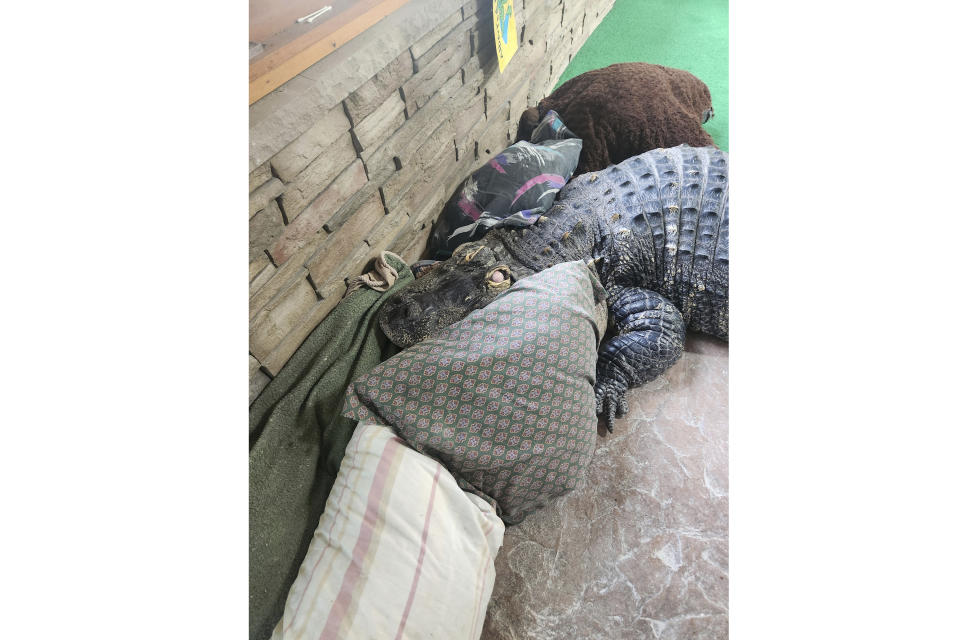So, you’ve probably heard about the craze of keeping exotic animals as pets, but have you ever thought about owning an alligator? Yeah, I’m talking about those toothy reptiles you’d usually see in swamps. Well, here’s the twist—some people are actually getting their hands on pet alligators, and sometimes, things don’t exactly go as planned. In fact, pet alligator seized incidents are becoming more common than you’d think. Let’s dive into this wild world of reptilian chaos!
Picture this: a suburban neighborhood, kids playing outside, and suddenly—BOOM—an alligator gets spotted in someone’s backyard. Sounds like a scene from a bad movie, right? But it’s happening in real life. Authorities are cracking down on these cases because, let’s face it, an alligator is not your average house cat. These creatures are dangerous, unpredictable, and definitely not meant to be cooped up in a fish tank or a kiddie pool.
Now, before we jump into the nitty-gritty details, let’s talk about why this is such a big deal. Sure, having a pet alligator might sound cool on paper, but the reality is far from glamorous. From legal issues to safety concerns, owning one of these reptiles can lead to some serious consequences. So, buckle up because we’re about to uncover everything you need to know about pet alligator seized cases.
Read also:Power Rangers Green Ranger The Ultimate Guide To The Emerald Warrior
What Exactly is a Pet Alligator Seized Incident?
Let’s break it down for you. A pet alligator seized incident happens when someone is caught keeping an alligator as a pet, and authorities step in to confiscate the animal. It could be because the owner doesn’t have the proper permits, the alligator poses a threat to public safety, or the conditions the animal is being kept in are deemed inhumane. These situations are becoming alarmingly frequent, and they highlight the dangers of keeping exotic animals as pets.
Here’s the kicker: alligators are wild animals, and they don’t adapt well to domestic life. Despite what some people might think, you can’t just pluck one out of the wild, toss it in a tank, and call it a day. These creatures need specific environments to thrive, and most people simply don’t have the resources or knowledge to provide that.
Why Do People Keep Alligators as Pets?
Believe it or not, there are actually a few reasons why people decide to keep alligators as pets. Some do it for the thrill of owning something rare and exotic, while others might have a genuine interest in reptiles. Unfortunately, a lot of these owners underestimate the challenges that come with caring for such a powerful animal.
Take a look at some of the reasons:
- Exotic Appeal: Let’s face it, alligators are cool. They’re ancient creatures that have been around for millions of years, and owning one feels like having a piece of history in your backyard.
- Ignorance: Some people simply don’t realize how dangerous alligators can be. They start off small and cute, but they grow quickly and become much harder to handle as they mature.
- Status Symbol: For others, owning an alligator is a way to show off. It’s like saying, “Hey, look at me, I’m bold enough to keep a predator in my home!”
Legal Implications of Keeping a Pet Alligator
Now, let’s talk about the legal side of things. In most states, keeping an alligator as a pet is either heavily regulated or outright illegal. There are strict laws in place to protect both the animals and the public. If someone is caught violating these laws, they could face hefty fines, criminal charges, or even jail time.
Here’s a quick breakdown of the legal landscape:
Read also:Teacher S E X A Comprehensive And Informative Discussion
- Permits: In many areas, you need a special permit to own an alligator. These permits usually come with strict guidelines about how the animal should be housed and cared for.
- Fines: If you’re caught without a permit, you could be slapped with a fine that ranges from a few hundred to several thousand dollars.
- Seizure: In most cases, authorities will seize the alligator and place it in a sanctuary or wildlife rehabilitation center. The animal is then cared for by professionals who know how to handle it properly.
How Dangerous Are Pet Alligators?
Let’s not sugarcoat it—pet alligators are dangerous. Even if they seem tame when they’re young, alligators are instinct-driven predators. They can grow to be over 10 feet long and weigh hundreds of pounds, making them a serious threat to humans and other animals.
Here are some alarming stats:
- According to the Florida Fish and Wildlife Conservation Commission, there are around 10 alligator attacks on humans each year in Florida alone.
- Alligators have incredibly powerful jaws, capable of exerting over 3,000 pounds of pressure per square inch.
- Many pet alligator owners end up releasing their animals into the wild when they can no longer care for them. This not only poses a danger to the public but also disrupts local ecosystems.
Real-Life Examples of Pet Alligator Seized Cases
There have been some truly bizarre cases of pet alligator seizures over the years. Here are a couple of examples:
Case 1: In 2019, authorities in Texas seized an 8-foot alligator from a man who was keeping it in his bathtub. The man claimed he had raised the alligator since it was a baby, but he was unable to provide proper care for it as it grew larger.
Case 2: In Florida, a woman was fined $500 after she was caught walking her pet alligator on a leash in her neighborhood. The alligator, which was about 4 feet long, was found to be malnourished and living in unsanitary conditions.
What Happens to Seized Alligators?
Once an alligator is seized, it’s usually taken to a wildlife sanctuary or rehabilitation center. These facilities are equipped to care for the animals and provide them with the proper environment they need to thrive. In some cases, the alligator might be released back into the wild if it’s deemed healthy enough to survive on its own.
However, it’s important to note that releasing seized alligators into the wild isn’t always the best option. Many of these animals have become accustomed to human interaction and may not have the skills needed to survive in their natural habitat.
The Importance of Sanctuaries
Sanctuaries play a crucial role in the care of seized alligators. They provide a safe and controlled environment where the animals can live out their lives without posing a threat to humans or other wildlife. These facilities also educate the public about the dangers of keeping exotic animals as pets and promote conservation efforts.
How Can We Prevent Pet Alligator Seized Incidents?
Prevention is key when it comes to reducing the number of pet alligator seized incidents. Here are a few ways we can tackle this issue:
- Education: Educating the public about the dangers of keeping alligators as pets is crucial. People need to understand the risks involved and the legal consequences of doing so.
- Enforcement: Law enforcement agencies need to continue cracking down on illegal alligator ownership. This sends a strong message that these actions won’t be tolerated.
- Adoption Programs: Some sanctuaries offer adoption programs for people who want to experience what it’s like to care for reptiles without actually owning one. This can be a great way to satisfy curiosity while keeping both humans and animals safe.
Alternatives to Owning a Pet Alligator
If you’re fascinated by alligators but don’t want to run afoul of the law, there are plenty of alternatives. You can visit wildlife sanctuaries, attend educational programs, or even volunteer at a reptile rescue center. These options allow you to get up close and personal with alligators in a safe and responsible way.
Here are a few ideas:
- Visit a Zoo: Many zoos have alligator exhibits where you can learn about these fascinating creatures and see them in a controlled environment.
- Join a Conservation Group: There are numerous organizations dedicated to protecting alligators and their habitats. Joining one of these groups is a great way to make a difference.
- Watch Documentaries: If you’re more of a homebody, you can watch documentaries about alligators and their behavior. This can be just as educational and entertaining as owning one.
Why Sanctuaries Are a Better Option
Sanctuaries offer a safe and ethical alternative to owning a pet alligator. They provide a home for animals that have been abandoned, abused, or seized by authorities. By supporting these facilities, you’re helping to ensure that alligators and other exotic animals are treated with the respect and care they deserve.
Kesimpulan
In the end, pet alligator seized incidents highlight the dangers of keeping exotic animals as pets. While the allure of owning a creature as unique as an alligator is understandable, the risks far outweigh the rewards. From legal issues to safety concerns, there are plenty of reasons why this trend needs to be addressed.
So, what can you do? Educate yourself and others about the dangers of exotic pet ownership. Support sanctuaries and conservation efforts. And most importantly, remember that alligators belong in the wild—not in your bathtub.
What are your thoughts on pet alligator seized incidents? Do you think more needs to be done to prevent them? Let us know in the comments below, and don’t forget to share this article with your friends and family. Together, we can make a difference!
Daftar Isi
What Exactly is a Pet Alligator Seized Incident?
Why Do People Keep Alligators as Pets?
Legal Implications of Keeping a Pet Alligator
How Dangerous Are Pet Alligators?
Real-Life Examples of Pet Alligator Seized Cases
What Happens to Seized Alligators?
How Can We Prevent Pet Alligator Seized Incidents?
Alternatives to Owning a Pet Alligator
Why Sanctuaries Are a Better Option


